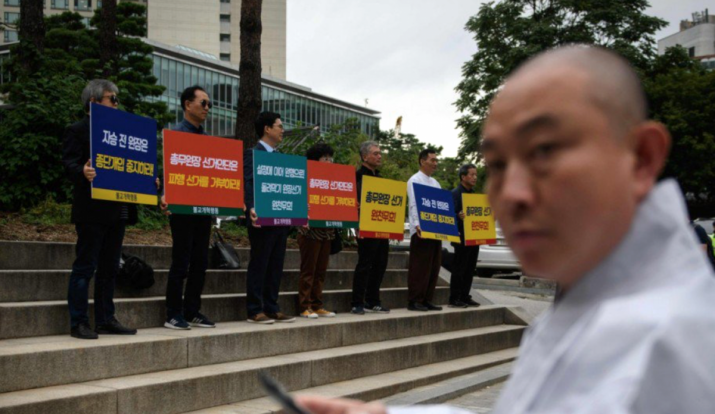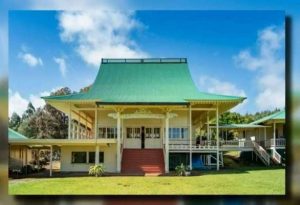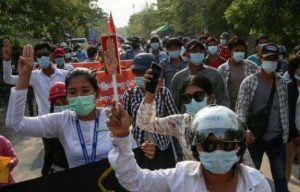
The Jogye Order of Korean Buddhism, South Korea’s largest Buddhist order, has elected Venerable Wonhaeng as its 36th president, filling a void left by the order’s previous senior executive Ven. Seoljeong , who resigned in August after apologizing for a series of scandals that had enveloped the Jogye Order and Ven. Seoljeong’s leadership of the organization.*
In a post-election address on Friday, Ven. Wonhaeng, who assumed office with immediate effect said, “I feel a grave responsibility rather than the joy of being elected.” He pledged to heal the rifts within the Jogye Order, as well as to improve the welfare of monastics and to fulfill his social obligations. “I feel a sense of responsibility for the dire reality facing Buddhism and our order,” the 65-year-old monk observed. “I will do my best to have [the Jogye Order] fully restore its Buddhist virtue.” (The Korea Times, The Korea Herald, The Straits Times)
Ven. Seoljeong resigned in August after an extraordinary no-confidence vote by the order’s Central Council, having completed just nine months in office. His leadership was tainted by a barrage of allegations of impropriety against the 76-year-old monk since his election in October last year, including lying about his academic background, misusing and embezzling the order’s funds, and secretly fathering a daughter out of wedlock.
The Jogye Order is a school of Seon (Zen) Buddhism that traces its roots back 1,200 years to the Unified Silla (also known as the Later Silla) kingdom (668–935). The Jogye school as a distinct entity emerged in the late 11th century when the monk Bojo Jinul, credited as the school’s founder, sought to combine Seon practices with the theological underpinnings of sutra-based Buddhist schools, including Korean Pure Land Buddhism. The order now represents the largest segment of South Korea’s Buddhist population, administering about 1,900 active temples and more than 13,000 monastics and 7 million lay followers nationwide.
Ven. Wonhaeng was elected to a four-year term in office by a majority of 235 votes out of 315 cast at the referendum held in the Jogye Order’s main temple in downtown Seoul on Friday. His appointment still has to be approved by the order’s Central Council of senior monks.

The three other candidates for the post dropped out of the race on Wednesday last week, alleging that the election held on 28 September had been fraudulent. Meanwhile, some Buddhist groups and senior monks have threatened to reject the appointment of Ven. Wonhaeng unless election rules within the Jogye Order are reformed.
In a joint statement released on 26 September, the three former candidates—Ven. Hyechong, Ven. Jungwoo, and Ven. Ilmyeon—alleged that they had witnessed illicit activities during the election process. The three monks accused a powerful former president of the order, Ven. Jaseung, of using his influence in favor of Wonhaeng. Ven. Jaseung governed the Jogye Order for eight years until 2017, although his presidency was marked by allegations of corruption, gambling, and impropriety.
“We realized our wish and endeavor to overhaul the Jogye Order would turn out to be in vain even if one of us is to be elected,” the monks said in their statement. “We agreed to drop out of the campaign en masse to raise the flawed election issue.” (The Korea Times)
Representatives of 26 pro-reform groups demonstrated outside the Jogye Temple in Seoul on Friday, demanding that the leadership vote be thrown out. “This election has already become null and void with the resignation of the three other candidates,” the group said in a statement. They called for a direct vote for the Jogye Order’s presidency by the order’s lay members. (The Straits Times)
According to data from the 2015 national census, the majority of South Korea’s population—56.1 per cent—holds no religious affiliation. Christians make up the largest religious segment of the population at 27.6 per cent, while Buddhists account for 15.5 per cent.
* Head Monk of South Korea’s Jogye Order Steps Down (Buddhistdoor Global)
The Head of Korea’s Largest Buddhist Order Apologizes for Corruption Furor (Buddhistdoor Global)
See more
Buddhist order picks new executive chief in disputed election (Yonhap News Agency)
Jogye Order has new leader amid rift (The Korea Times)
Buddhist order picks new executive chief in disputed election (The Korea Herald)
Scandal-plagued South Korea Buddhist sect elects new leader (Straits Times)












